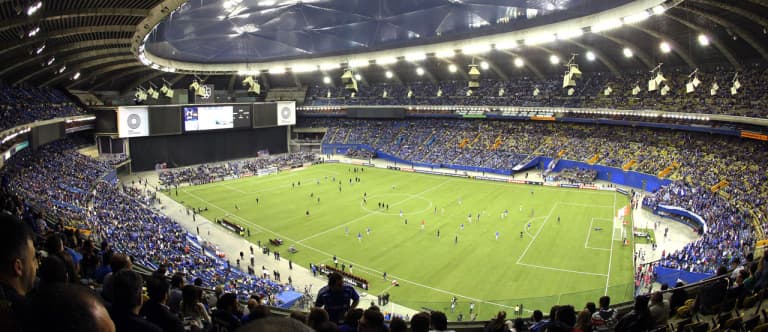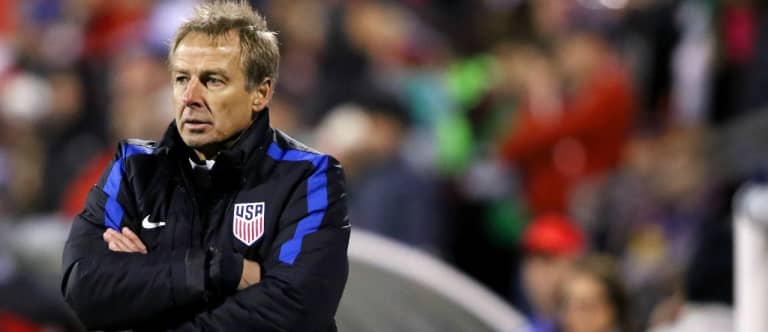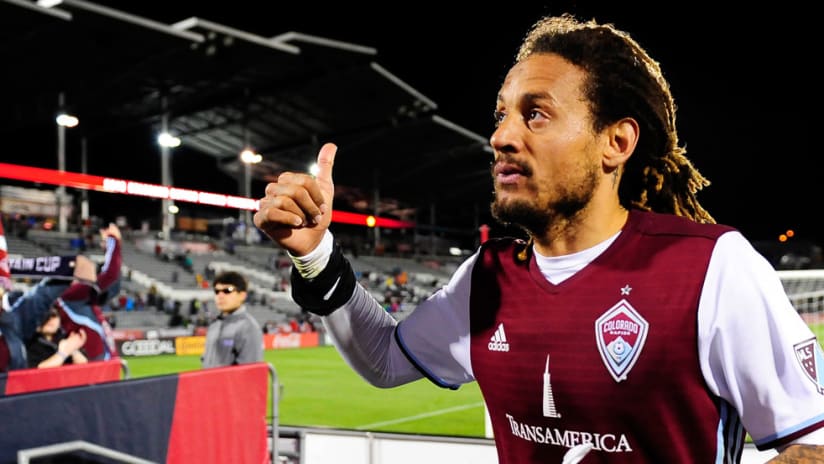The international break is over. Our sad soccer nation and the other, undoubtedly happier one up north can now fully turn toward the upcoming Conference Championships as the 2016 Audi MLS Cup Playoffs return to the spotlight.
I’ll start out West, where the buildup to the Colorado Rapids-Seattle Sounders matchup has been rightfully dominated by injury talk. Rapids goalkeeper Tim Howard is out, the capable Zac MacMath is back in. Talented Colorado attacker Shkelzen Gashi is "doubtful" for Leg 1, while the Sounders don’t yet know whether or not Jordan Morris, who had to bail on the US national team due to a hamstring injury, or Alvaro Fernandez will be available for the opener on Tuesday at CenturyLink Field (10 pm ET; FS1 in the US, TSN1/3, RDS2 in Canada).
Jermaine Jones, whose injury issues have dominated the headlines since the summer, will play a major part in the match and series after returning from USMNT duty. Conceivably, he could be playing his final games in Colorado, as well. A source told me earlier this week that the 35-year-old’s contract will expire at the end of the year and that the Rapids do not hold a club option to extend his current deal.
Jones, whose initial MLS contract with New England expired following the 2015 season, was acquired by the Rapids in March via trade with the Revs and immediately signed to a new deal. Colorado announced at the time of the move that they used Targeted Allocation Money to buy down Jones’ contract so that he would not count as a Designated Player in 2016.
Because Jones, who had a protracted, public negotiation with New England last winter, is only in his third season in MLS, he won’t be eligible for the league’s free agency this offseason. Should he not re-sign quickly with Colorado, he’d be eligible for the league’s Re-Entry Draft. If he chooses to opt out of Re-Entry, the Rapids would retain his MLS rights, meaning any other MLS team interested in acquiring the US international would have to do so via trade with Colorado. As is the case with any MLS player out of contract, Jones would be free to move to a league outside of MLS this winter.
The Rapids, who will also see head coach Pablo Mastroeni’s contract expire after the season, declined to comment on Jones’ contract status on Wednesday.
Regardless of whether or not this is one of his final games in burgundy, this series might just be decided by how Jones and fellow central midfielders Sam Cronin and Micheal Azira fare against Seattle's star creative midfielder Nicolas Lodeiro and his formidable central-midfield partners, Ozzie Alonso and Cristian Roldan, all of whom have been excellent this year.
As they’ve done all season, and as they did in the first leg of their Western Conference Semifinal series at LA, Colorado will likely sit deep, do their best to keep a shutout and try to hit the Sounders on the counter in Seattle on Tuesday. He could go a different route, but, if Gashi can’t start, I expect Mastroeni to return Azira, a former Sounder, to the XI to partner Cronin at defensive midfield, slot Jones in as the No. 10, push Kevin Doyle to striker and slide Dominique Badji out to the wing.
The deep-lying Cronin and Azira should both spend plenty of time on Lodeiro’s hip, while Jones, who Mastroeni said on Wednesday should be “full go” for Leg 1 after playing all but 19 minutes of the US’s losses to Mexico and at Costa Rica, will be tasked with harrying Alonso and Roldan.
Colorado have preached all year about team defending. Listen to Mastroeni talk about his league-best defense and you’ll hear him say that it starts with the team’s attackers making plays easy to read for Cronin and Azira, who in turn funnel things predictably toward the back four.
Lodeiro, of course, has the talent to make any Rapids plan meaningless. The key for Colorado will be limiting how many times he’s able to get the ball in dangerous positions. That’s why the defensive work of Jones, Colorado’s wingers and the Rapids’ striker will be so important. If they can make it hard for Alonso, Roldan and the Sounders defenders to find Lodeiro, it’ll be much easier for Cronin, Azira and the Rapids’ back four to keep him from repeating his two-goal performance in Seattle’s 3-0 first leg win against Dallas last round.
“They have a very formidable midfield trio,” Sounders head coach Brian Schmetzer told reporters on a conference call on Wednesday. “It will be a game where a lot of those plays that can make a difference in a game, a lot of it will hinge around which group of three can kind of maintain tempo, dictate tempo, make some plays, get their team involved, get their teammates involved.”

Big night at the Big O
No matter what happens in the first leg of their Eastern Conference Championship series against Toronto FC, the Montreal Impact will make a bit of history at Olympic Stadium on Tuesday night (8 pm ET; ESPN in the US, TSN1/3, RDS in Canada).
The club will set a new MLS playoff record for highest attendance at a non-MLS Cup match in Leg 1. Montreal announced on Wednesday that they’ve already sold 55,000 tickets for Tuesday night, smashing the previous non-MLS Cup postseason record of 46,768 fans who saw the Seattle Sounders host the LA Galaxy in Leg 2 of the 2014 Western Conference Championship.
When MLS Cups are included, the game is already third in playoff history in attendance, and will likely end up passing MLS Cup 1997 at RFK Stadium (57,431) for second on the all-time postseason attendance chart. The all-time playoff attendance record of 61,316 set at MLS Cup 2002 at Gillette Stadium is sadly out of reach for Montreal, as Olympic Stadium’s current capacity for soccer is set at 61,004.
If Montreal, who usually open their home schedule each year indoors at Olympic Stadium but play the vast majority of their home matches outdoors at the neighboring Stade Saputo, sell-out Tuesday’s match, they’ll tie their own all-time attendance record of 61,004 set in Leg 2 of the 2014-15 CONCACAF Champions League final against Club America.
There are few things in MLS I enjoy more than a big crowd at the Big O. If past packed houses at the stadium are any indicator (he may be in Kansas City now, but Montreal will never forgetCameron Porter), Tuesday might end up being the most memorable night in MLS’s Canadian history.
“This is going to be special,” Impact captain and native Montrealer Patrice Bernier told reporters on a conference call on Wednesday. “And it’s a historic moment because the club has been in the league since 2012, and now at the fifth season, to be able to get to this stage and hopefully move on to other moments, but it is a great moment and just to appreciate it and enjoy it. But it’s great to see that the crowd has really responded and we were able to fill up the Big O with 60,000 seats.”

Jurgen out? Consider the contract
I spent a decent chunk of Wednesday talking to a few non-national team players and MLS executives about Jurgen Klinsmann in the wake of the USMNT’s dismal performance in Tuesday’s 4-0 loss at Costa Rica.
One theme that came up in all of my discussions? Everyone that I spoke to said that they thought Klinsmann had lost the team.
Judging by the last couple of games, it’s hard to argue against that point. Beginning with the ill-advised 3-5-2 (er, 3-4-3) formation used at the start of last Friday’s Mexico game, continuing with the less than harmonious quotes from coach and players after the 2-1 loss to El Tri and culminating with multiple players appearing to show a little less intensity than usual in the defeat at Costa Rica, it’s pretty clear that Klinsmann and the USMNT weren’t exactly on the same page over the past week.
I asked the players that I spoke to on Wednesday what it feels like to play on a team that’s tuned out their coach. Their responses ranged from the expected (I got a lot of “depressing” and “helpless”) to the somewhat hyperbolic (“I really feel bad for the players,” “it looks like he doesn’t really want to do anything,” and “nothing is fair or makes sense in American soccer”).
Like many, manyothers out there, the players and execs I spoke to on Wednesday said that this should be the end for Klinsmann.
They also thought that US Soccer wouldn't make a change.
Steve Davis did a nice job of summing this up in his weekly column at FCDalllas.com on Wednesday, but Klinsmann’s contract is one of the reasons why the folks I spoke to think the German might stick around. We know that he makes at least $2.5 million per year and is signed through the 2018 World Cup. If he’s fired, he’ll presumably be owed at least a portion, and perhaps all, of the money left on his deal.
US Soccer president Sunil Gulati told SI’s Grant Wahl after Tuesday’s dispiriting loss that the USSF will “think about what happened today and talk with Jurgen and look at the situation.” The chunk of change owed to Klinsmann won’t be the only thing Gulati and the USSF board consider as they evaluate their head coach in the coming days, but it is something to keep in mind. If Klinsmann stays on, his contract could be a big reason why.













